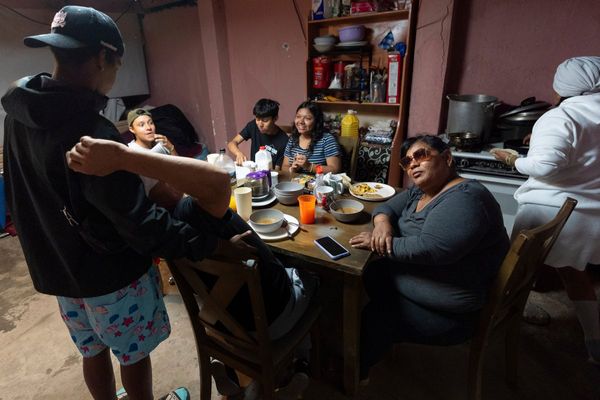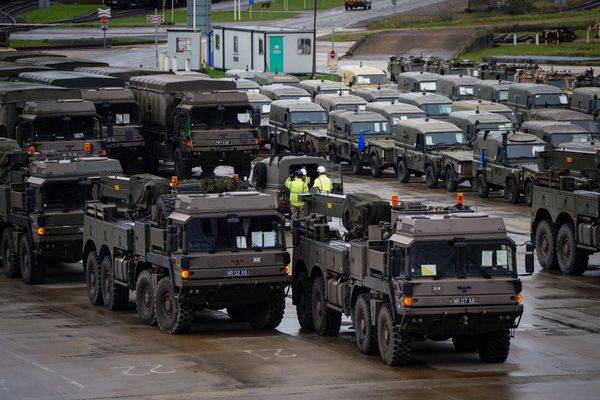
STUTTGART, Germany—Just over one month ago, my active-duty Air Force husband and I, along with two cats, three suitcases, and an acoustic guitar, set off from Washington, D.C., for the southern German city of Stuttgart as one of many U.S. military families trying to make an overseas move during a pandemic.
Any overseas move is unpredictable and chaotic. This year, the pandemic has made it even harder. A turbulent process that began weeks, even months, before stepping on an airplane is reduced to a brief respite in purgatory—in our case, a Marriott hotel that has become our new home—where our lives are put on hold and our movements governed by local and U.S. military policies that can change in a day.
When we finally got to Stuttgart—home, for now, of U.S. European Command and U.S. Africa Command—we were taken to the drive-thru COVID-19 testing center at the Stuttgart Army Health Clinic. There, we received nose swabs and were told to remain in full quarantine—no leaving our hotel room for any reason—until receiving a negative result about four days later.
That result in hand, we could then enter “working quarantine” and be allowed to exercise outdoors and order restaurant takeout. A week after our arrival, we got our second negative test, meaning we could move about freely—and finally begin all the nightmarish tasks required in a big move: setting up a local bank account, getting a local phone number, registering a vehicle, in-process on the base, and looking for a house. Overseas, you also need to secure ration cards to buy items such as coffee, alcohol, and fuel on the base—to prevent one from potentially selling such highly taxed items out on the local economy.
For many military families, the summer of 2020 will go down as the most stressful overseas move yet, thanks to increased health concerns, financial strain, and unpredictable schedules, according to nearly a dozen service members and their family members interviewed by Foreign Policy.
We learned in January that we would be moving to Stuttgart this summer but were left unsure of our status after U.S. Defense Secretary Mark Esper issued a “stop movement” order for all nonessential military personnel in March. We were finally confirmed to move in early June. Many other families have their orders on hold indefinitely. Those stacked-up moves will create challenges for officers in charge of coordinating household pickups, flights, and other logistics, said Ben Hodges, a retired U.S. Army lieutenant general who served as the commanding general of U.S. Army Europe from 2014 to 2017.
“None of these moves happen in a vacuum. That creates a bit of uncertainty, and that will create challenges for the contracting officers,” he told Foreign Policy.
That said, it’s unlikely that the chaotic situation under COVID-19 will have a long-term impact on military readiness, however stressful it is for the families caught in the middle. “There is going to be a small percentage of efforts that are not perfectly aligned, but that would not affect overall readiness,” Hodges said.
As COVID-19 cases soared in the United States this spring, the stop movement order was extended several times and coincided with the start of the summer season for the move, known as a permanent change of station, or PCS. Military families typically know the location of their new assignments months in advance, and some had already put their houses on the market. As their leave date was pushed back, they were left scrambling for a place to live.
Kaysie G. and her husband, an Air Force captain, were scheduled to relocate with their 2-year-old son and pet dog in late March from South Dakota to Stuttgart. It was their first overseas move, and with a child to boot, so they got the ball rolling as soon as possible—and then got bushwhacked by the stop orders.
“We had done everything as much as we could, and then they shut everything down,” Kaysie told Foreign Policy. “We had to undo all of it … and we had to delist the house.”
“It was almost like we PCSed twice, because we did everything twice,” she continued. “It’s hard to be in limbo.”
Simply getting permission to move during the stop movement order is an ordeal. Service members are required to get paperwork signed by a general officer from both their old units and their new one—adding weeks of uncertainty chasing one- and two-star generals for a signature.
Even when those hoops are cleared, families soon find fresh ones. Kat Lancaster and her husband, an Air Force major, arrived in Stuttgart from Fort Leavenworth, Kansas, on July 15, and were waiting in the drive-thru clinic line to get swabbed when the newest testing-and-quarantine policy came through. Based on an uptick in COVID-19 cases coming from recently arrived service members, Lancaster, as the dependent, would no longer be tested. Instead, she was required to spend two full weeks in the hotel room—no more working quarantine allowed—making it that much harder to start building her new life.
“You want to be compliant, and you want to be doing the right thing,” Lancaster said. “But then when you do the right thing, and tomorrow it’s the wrong thing, it just gets really frustrating.”
Even after quarantine is at last over, these expats face new decisions to make. Thanks to COVID-19, many families are looking for bigger houses than they expected so they have enough space for everyone to work from home. The tough choice of whether to put kids into schools on base or in local schools is complicated by ongoing plans for virtual learning in most schools; several families are simply opting for home schooling.
The stress of moving during a pandemic will not go away soon. Several spouses said they took advantage of resources such as the military and family life counseling program for the first time after their move.
And then, at the end of July, came some news met with consternation in Stuttgart, as Esper announced plans to withdraw nearly 12,000 troops from Germany. The announcement that the headquarters of Eucom as well as Special Operations Command Europe would move from Stuttgart to Mons, Belgium, and that Africom would also eventually leave Stuttgart, will deeply impact the community here.
Esper said in a July 29 Facebook post that no current PCS orders to Europe would be canceled as a result of the realignment plan, and analysts are skeptical such a move could be accomplished in less than three years, if it happens at all.
Still, the announcement cast new uncertainty in a community that has just undergone months of confusion. While few believe current tours here would be cut short, the mercurial nature of the Trump administration has taught us to never say never.
Meanwhile, although the process of arriving and settling into Stuttgart has been far from smooth, families acknowledge the effort made by local military leadership to soften the impact through virtual town halls and community outreach.
“I really do think they’re trying really hard” to help new arrivals through the quarantine procedures, Lancaster said. “I don’t think it’s for lack of effort. I think it’s just utterly confusing.”







